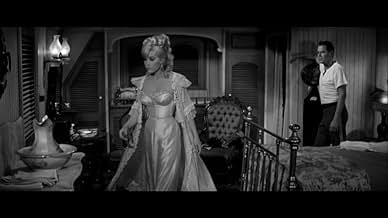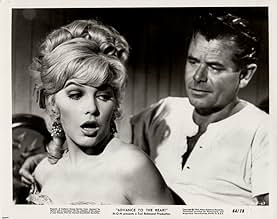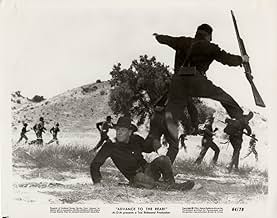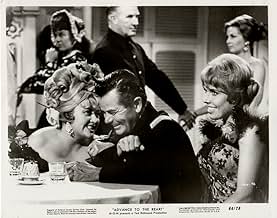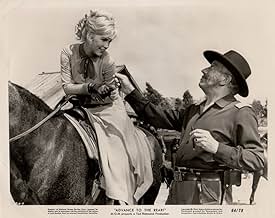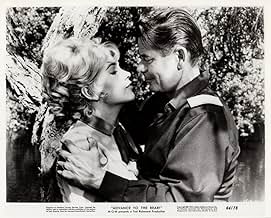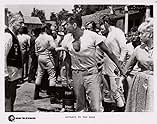Füge eine Handlung in deiner Sprache hinzuWhen A Union Army outfit of misfits and rejects is sent to the Western territory, Southern spies try to figure out what they're doing there.When A Union Army outfit of misfits and rejects is sent to the Western territory, Southern spies try to figure out what they're doing there.When A Union Army outfit of misfits and rejects is sent to the Western territory, Southern spies try to figure out what they're doing there.
- Sergeant Davis
- (as Alan Hale)
- Courier
- (Nicht genannt)
- Waiter
- (Nicht genannt)
- Steamboat Captain
- (Nicht genannt)
- Member of the Law & Order League
- (Nicht genannt)
- Trooper
- (Nicht genannt)
Empfohlene Bewertungen
Technically, the book was a historical novel, centred around the fictional character of Jared Heath, himself a disgraced Union officer, busted to sergeant, who was detailed to take charge of a company of other disgraced officers who had also been demoted for crimes such as desertion, disobedience, brawling and other such offences that are not tolerated in any Army, past or present. The end of the novel describes how Jared Heath and his "Company of Cowards" manage to redeem themselves during a heroic battle against Comanche and the Kiowa Indians, with a few of them giving their own lives in the heat of battle.
I should imagine that the producers and MGM had a lot of debate about how this film should be made. Was it to be a film about the true horrors of war and how disgraced soldiers were treated by the other troopers, as depicted in the novel? No, it was to be made as a knockabout comedy, directed by George Marshall, who had already directed James Stewart in "Destry Rides Again" and Glen Ford in a few other films, such as another comedy western, "The Sheepman".
A question had already asked as to whether the television comedy series, "F Troop" was loosely based on this film. Well, as the series was released on ABC a year later, it is probably more than a coincidence that the producers of the series did take some inspiration from this film. Ken Berry would have been a more naïve version of the Glen Ford character.
Jack Schaefer's novel was a very serious study on how the American Civil War was fought, which went on to describe the horror of fighting in the Indians Wars, when many hostile Indian tribes took advantage of the fact that the "white men" were distracted with fighting each other.
There were also some political comments about why the Union government kept changing its mind as to the reason for the war, starting out with political wrangles about why the Federal Government should have control over the distant Southern States; with the economic disparity between the Southern States and the Northern States; the need to keep the Union together; and, finally, the Abolition of Slavery.
Jack Schaefer wrote "Shane", one of the greatest and most realistic westerns ever written and filmed - I wonder what he thought of how his original novel was brought to the screen.
I will give the film 8 out of 10 for the lively performances of Glen Ford and the lovely Stella Stevens.
It's not hard to fall into liking this easy-going and ramshackle comedy, which switches easily from knockabout physical humour (with 'assorted' sound effects) to silly dialogue and a general feel that the assorted misfits of this Union regiment just aren't taking their roles that seriously. The story, for what it is has the regiment being sent out of reach of action but still manage to capture a rebel spy, played by Stella Stevens and they all end up in a heap of trouble. A $2 million gold bullion gets in the mix as do some rather "friendly" Indians.
Glenn Ford is easily the most recognisable as the captain and Melvyn Douglas as the Colonel "in charge" and these two string it all together and he's not bad at comic timing or deadpan delivery. He has a romantic fling with Stevens, as all the regiment do (in their dreams!) Destry Rides Again director George Stevens' film is in widescreen and (here) an attractively dark-greened tinged black & white and which runs for 96mins.
The comedy is gentle and clever rather than broad, or crude and the targets are fairly obvious but as it's all fairly sweet it's all a nicely pleasurable watch rather than anything classic or downright hilarious - though the scene where they storm the camp, dressed in long-johns, with boards on their feet down the dry grass slopes, to the soundtrack of a WW2 fighter plane battle is actually really rather humorous!
Back at the beginning of Ford's career, Marshall directed him in Texas along with another young star Bill Holden. Than it was almost a decade until they worked together again in one of Ford's best and probably funniest film, The Sheepman.
Ford had not done that much comedy up till then. Marshall took great advantage of Glenn Ford's really great gift for deadpanning some fabulous lines. They did five more films after that and Ford used him in his television series Cade's County. A good director/actor team turning out some great product.
I think George Marshall's not been given his due. He was best at comedy, but could also turn out good westerns. His most noted film, Destry Rides Again is a great blend of both.
Ford is a newly assigned lieutenant in a company that bears a striking resemblance to F Troop. Possibly this film was the inspiration for same. After a major snafu, they are assigned out in the west where it is hoped they cannot do too much damage to the Union cause.
And then it's discovered they are to be protecting a major gold shipment that Confederate guerrilla James Griffith is out to steal. Ford has an additional complication in that he's fallen for Confederate spy Stella Stevens.
You'll have a lot of laughs along the way in seeing if and how all these situations are dealt with. Another performance of note here is Melvyn Douglas as the commanding officer of the company. Douglas, two years past his Oscar for Hud, gets a real change of pace and he looks like he's having a ball playing the bumbling and pompous Colonel Brackenby.
Watch this one and you're in for good afternoon's share of laughs.
This movie was made during the short but glorious window of cultural innocence (between R & B and the Rolling Stones) when folk music was as popular as rock. The music is by Randy Sparks and sung by his New Christy Minstrals. The song 'Today' is from this movie.
Stella Stevens, as the Confederate spy, is gorgeous beyond description. Glen Ford plays the bemused hero trying to do things by the book admidst a collection of misfits ('We're a company of cowards and we've come to save the day.'). Jim Backus ('Gilligan's Island' and the voice of Mr. Magoo) leads a familiar cast of veteran supporting actors and actresses of the era. Did I mention that Stella Stevens is good looking?
'Advance To The Rear' is a B-movie masterpiece. One of those rare examples of everything coming together perfectly. For those of us who remember the era, it is also very evocative -- perhaps more so than any other movie of its time. It would be nice if whoever has the rights would release it, my VHS tape is getting a little flaky. By the way, they made an LP of the sound track. Now that be a major garage sale find.
Wusstest du schon
- WissenswertesThe steamboat used in this movie was originally built and used as the Cotton Blossom, in MGM's Mississippi-Melodie (1951). It was also used in Das Land des Regenbaums (1957) and Abenteuer am Mississippi (1960). In the 1970s, it was one of the props auctioned off by the studio.
- PatzerIn the scenes where the cannons fire 30 rounds, some of the cannons fire before their fuses are ignited.
- Zitate
Martha Lou: All right. Let's say, just for the moment, that I *am* a spy.
Heath: A very pretty one, too.
Martha Lou: That would make us enemies, Jared.
Heath: Yeah, of course it would. And, we'd be starting out at a point in marriage that takes some couples twenty or thirty years to achieve!
Top-Auswahl
- How long is Advance to the Rear?Powered by Alexa
Details
- Laufzeit1 Stunde 40 Minuten
- Farbe
- Seitenverhältnis
- 2.35 : 1
Zu dieser Seite beitragen



